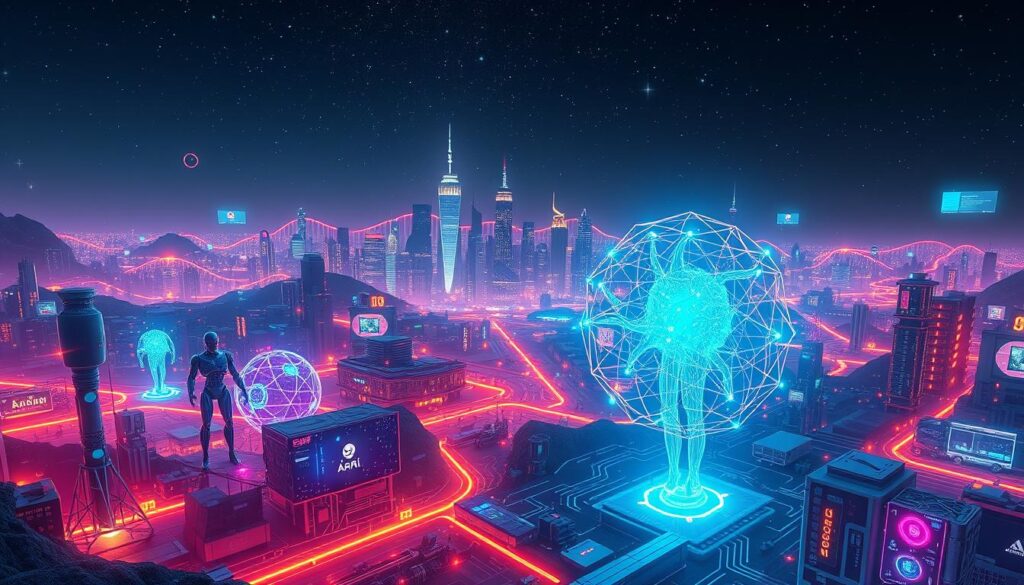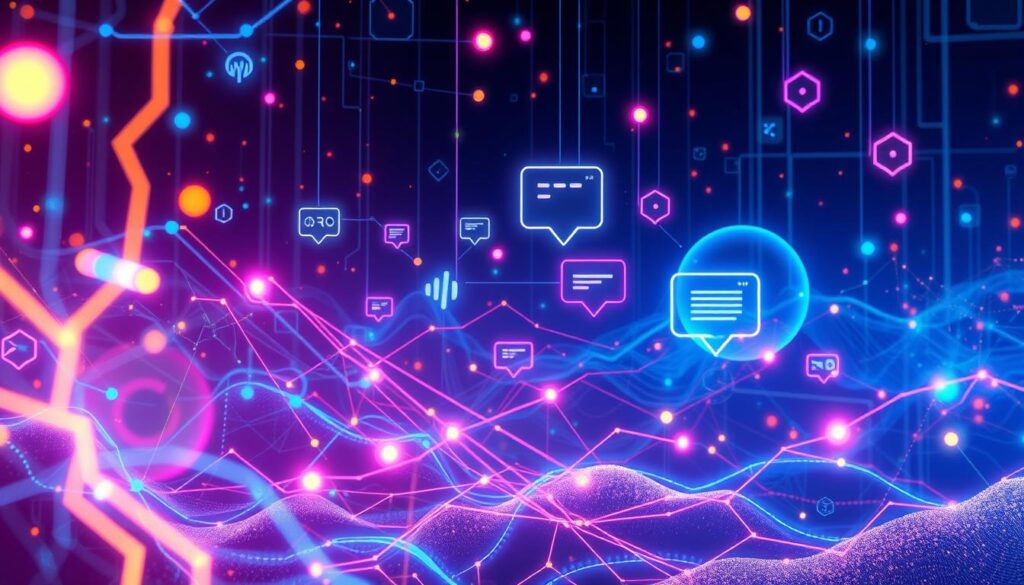Is there a better AI than OpenAI? This question is key in today’s fast-changing tech world. Many companies are now in the AI game, making it important to look at OpenAI’s rivals. We’ll check out top models like ChatGPT and new ones too.
Businesses and people want the best AI chatbot for their needs. Knowing what’s out there helps them make smart choices1. By comparing OpenAI with its competitors, users can find the right AI tools for them.
Key Takeaways
- OpenAI faces fierce competition in multiple AI sectors including generative AI and NLP.
- The API services like GPT-4 and DALL-E enable advanced integrations in applications.
- Cost, privacy, and complexity are significant challenges using OpenAI.
- Google Gemini boasts a higher token limit than ChatGPT, enhancing its functional capabilities.
- Emerging competitors include Anthropic and Mistral AI, known for their unique features.
Introduction to the AI Landscape

The artificial intelligence landscape is changing fast. AI technologies are being used in many areas. In 2020, the AI market was worth $108.42 billion. It’s expected to grow to $305.9 billion by 2024, showing a strong growth rate of 15.83% until 20302.
Tools like ChatGPT have made AI more popular. OpenAI says 180.5 million people used it by April 20242.
AI is changing how companies talk to customers and work better. For example, Anthropic got $4 billion from Amazon2. This shows a lot of money is going into AI, making the market exciting.
Big names like Google and xAI are also making waves. They’re pushing the boundaries of what AI can do. This keeps the conversation about AI’s future going strong.
The Rise of OpenAI and Its Technologies
OpenAI started in December 2015, becoming a top name in AI3. People like Sam Altman and Elon Musk helped it grow strong3. In 2019, OpenAI changed to a “capped-profit” model. This move helped it get more money while staying true to ethics3.
The launch of ChatGPT in November 2022 was a big deal. This AI chat model, based on GPT-3, quickly became popular. It hit 100 million users in just two months3. People loved it for making things better and helping with content3.
DALL-E changed the game in image making, creating pictures from text. It opened up new uses for AI in many fields3. OpenAI’s growth was boosted by a deal with Microsoft in early 2023. This deal brought in $10 billion to $13 billion, helping OpenAI grow even more4.
Key Features of OpenAI ChatGPT

OpenAI ChatGPT is a standout in the world of artificial intelligence. It was released in 2022 and has made generative AI more accessible. It uses both supervised and unsupervised learning to create responses that feel real and make sense.
Capabilities in Natural Language Processing
ChatGPT uses models like GPT-3 and GPT-4 to create text that sounds like it was written by a human. It has a vast knowledge base and focuses on making conversations smooth. This makes it great for both casual chats and complex tasks56.
The model is fine-tuned for many uses, from writing and coding to creating dialogues. Its versatility puts it at the top of natural language processing efforts.
Applications in Business and Personal Use
ChatGPT has many uses in business and personal life. It’s useful for automating customer support, acting as a virtual assistant, and creating chatbots that interact well with users6. It helps professionals write emails or reports, making work more efficient and keeping interactions friendly.
This makes ChatGPT a popular choice for companies wanting to use advanced AI in their work.
Identifying Competitors in the AI Space
The AI world is always changing, with many players vying to be the best. Google DeepMind is a big name, known for its top-notch algorithms and models like WaveNet and AlphaStar. These have raised the bar in machine learning.
OpenAI has been a leader since 2015, starting as a non-profit and then becoming a capped-profit. It partnered with Microsoft in 2019, getting a huge investment by 20237. This partnership helped OpenAI grow, allowing it to create many AI models for text, images, and audio7.
Looking at the market, ChatGPT alternatives are catching eyes. The Allen Institute for Artificial Intelligence has made models like Molmo 72B. They match the top models like GPT-4o in many tests8.
These models show that open-source can compete with the big guys. They are not just advanced but also free, offering a cheaper option. This diversity in AI means users have more choices, finding the best fit for their needs.
Is there a better AI than OpenAI?
In the fast-changing AI world, comparing AI options is key for those looking for better solutions. Google Gemini is a strong competitor, especially for Google Workspace users. It has a lot of training data and features, making it a top choice for those in the Google ecosystem.
A Comparison with Google Gemini
Google Gemini stands out because it works well with Google services. It’s great for teams using Google apps, boosting productivity. The release of ChatGPT by OpenAI in November 2022 pushed the AI market forward. This led to the creation of Google Gemini and Anthropic Claude in February 2023.
Users find Gemini better for real-time projects, making teamwork more efficient. It works smoothly across different platforms910.
Other Notable Alternatives: Anthropic and Mistral AI
Anthropic Claude is known for its chat skills and understanding of context. It’s perfect for ethical discussions. Claude’s way of talking is thoughtful, especially in sensitive topics10.
Mistral AI is all about making text creation easier for businesses. It helps companies stay ahead by generating content quickly. Each of these, including Google Gemini, has unique features that might be better than OpenAI for certain users. So, comparing AI is essential for finding the right one.
Advantages of Using OpenAI
OpenAI is a leader in artificial intelligence, offering many benefits to users globally. It excels in natural language processing thanks to its advanced large language model (LLM) transformers11. This makes it a top choice for understanding and creating text on various subjects11.
OpenAI uses a vast amount of training data, far more than its rivals. This gives it a deep understanding that’s unmatched11. Users can explore many applications, from writing to business needs. ChatGPT’s ease of use makes it accessible to those new to tech, yet it’s powerful12.
OpenAI keeps improving its models based on real-world feedback. This keeps them ahead in AI technology11. Also, OpenAI’s API services ensure data safety with encryption and monitoring for unauthorized access12.
Drawbacks of Relying on OpenAI
OpenAI has gotten a lot of attention and praise. But, there are downsides to using its services. The cost can be a big worry, especially for small businesses or startups. OpenAI’s revenue is expected to hit $200 million by 2023 and $1 billion by 202413.
This high cost makes companies look for cheaper alternatives. They want something that won’t break the bank.
Cost Considerations
When using OpenAI, companies need to watch their spending. Building apps with models like GPT-3 can be very resource-intensive13. This increases the overall cost.
Also, some vendors offer pricing per page, which might be easier to budget for. This is different from OpenAI’s token-based pricing14.
Privacy and Accessibility Issues
Using OpenAI raises data privacy concerns. Companies share sensitive info through its platforms. They must protect user privacy from potential risks15.
Being too reliant on one AI service can limit access to new tech. This hinders innovation. Companies also face the risk of service disruptions15.
It’s important to understand these drawbacks before making a decision.
Analyzing the Best Alternatives to OpenAI
The AI world is always changing, leading users to look for the best OpenAI alternatives. Jasper is a top competitor, known for its business use and advanced content generation. Perplexity is another strong contender, great for quick and informative searches. Both Jasper and Perplexity have unique strengths, making them stand out in their fields.
Studies show GPT-4o is better for tasks that don’t need deep analysis, proving its versatility16. GPT-4 Turbo also shines, especially in finding specific information16. The launch of BingAI chat drew over 1 million users to its waitlist, showing a big interest in new AI options17.
StabilityAI has caught a lot of attention, raising $435 million in investments, highlighting the value of various AI technologies17. Cohere is known for its ability to work in over 100 languages, making it a hit worldwide17. This shows the AI market is full of options, helping businesses find the right tools for them.
Conclusion
The AI world is changing fast, with OpenAI leading the way but facing tough competition. OpenAI has made big strides, especially with its GPT-3 model. They’ve also published over 100 research papers, getting over 15,000 citations in AI and machine learning18.
But, Google has invested over $3.9 billion in AI startups. And platforms like iGirl offer new ways to interact, making friends online1920.
It’s clear that AI is a competitive field. The market is expected to hit around $1,394.30 billion by 202918. Users need to know what they need from AI to make the right choice.
Whether it’s OpenAI or another platform, each has its own strengths. It’s key to find the one that fits your needs best.
FAQ
What are some of the best alternatives to OpenAI?
How does ChatGPT compare to other AI chatbots?
What are the main advantages of using OpenAI’s technologies?
Are there any concerns regarding privacy when using OpenAI?
What impact did the launch of ChatGPT have on the AI industry?
How can users determine which AI tool is right for them?
What are the cost implications of using OpenAI services?
Source Links
- Best OpenAI Alternative APIs in 2024 | Eden AI
- The Great AI Race: Understanding the Artificial Intelligence Landscape
- How Did OpenAI Rise from Obscurity to AI Leadership Through ChatGPT?
- How Does OpenAI Survive?
- Open AI vs. ChatGPT: Exploring the Differences – InBound Blogging
- ChatGPT vs. OpenAI: What’s the Difference? – Unlimited Graphic Design Service
- 🦄 The top six rivals competing with OpenAI
- These Mini AI Models Match OpenAI With 1,000 Times Less Data
- The best AI chatbots of 2024: ChatGPT, Copilot, and worthy alternatives
- Comparing OpenAI o1-Preview, ChatGPT-4.0, and Claude AI: My Developer’s Perspective
- OpenAI in the AI Landscape
- OpenAI vs. Azure OpenAI Services – Private AI
- Pros and Cons of Using OpenAI in Mobile App Development
- Rivals of AI: OpenAI vs. Other Super Providers
- Why you should not rely on (only) one AI provider?
- GPT-4 vs GPT-4o? Which is the better?
- Top 10 OpenAI Alternatives | BlockSurvey
- OpenAI vs. DeepMind (In-depth Comparison in 2024)
- Artificial Intelligence Giants: Comparing Google and OpenAI’s Strategies for Success – Hire Remote Developers | Build Teams in 24 Hours – Gaper.io
- Comparing AI: iGirl versus OpenAI







